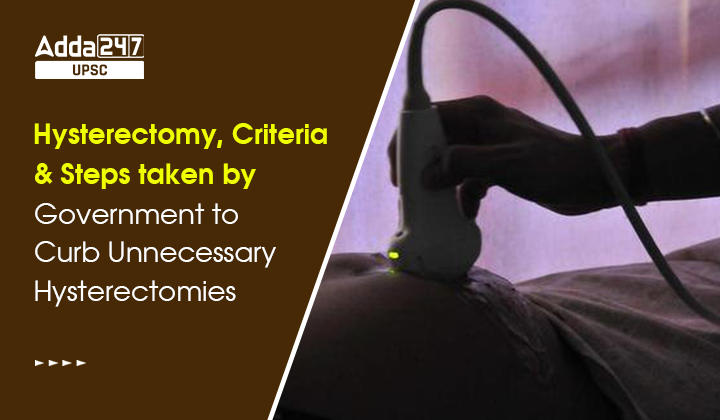Table of Contents
Hysterectomy: Hysterectomy is a surgical procedure that involves the removal of the uterus. It may be performed for various reasons, including the treatment of gynecological conditions such as excessive menstrual bleeding, uterine fibroids, endometriosis, uterine prolapse, or certain types of cancer. Various aspects related to Hysterectomy are also important for UPSC Prelims Exam and UPSC Mains Exam (GS Paper 2- Various governance issues related to health and human resources in India).
Hysterectomy in News
The Union Health Ministry recently urged State governments to audit hysterectomy trends in public and private hospitals, in response to a Supreme Court petition arguing that women from marginalised locations are at risk of unjustified hysterectomies for economic gains and exploitation.
Criteria for Getting Hysterectomy and Associated Concerns
Based on data from the National Family Health Survey (NFHS-5), the highest proportion of hysterectomies (51.8%) were performed to address excessive menstrual bleeding or pain, followed by 24.94% for fibroids, 24.94% for cysts, and 11.08% for uterine disorders or rupture.
- However, studies indicate that many of these conditions could be treated without surgery, raising concerns about the unnecessary use of hysterectomies.
- These cases are predominantly reported among socially and economically disadvantaged women.
- The procedure can be exploited by private clinics seeking financial gain through insurance reimbursements or by contractors in unorganized sectors like the sugar-cane-cutting industry, where the prevalence of “wombless women” is encouraged to avoid the need for menstrual care and hygiene among workers.
Steps taken by Government
In 2022, the Union Health Ministry released guidelines aimed at preventing unnecessary hysterectomies. These guidelines outlined potential indications for when a hysterectomy might be necessary, along with alternative clinical treatments for gynecological conditions.
- Additionally, the ministry recommended the establishment of monitoring committees at the district, state, and national levels to collect data on age, mortality, occupations, and other relevant details related to hysterectomies.
- These monitoring committees are also responsible for raising awareness among healthcare practitioners and patients regarding the role of the uterus, bodily anatomy, and the appropriate indications for hysterectomies.
- A study conducted in Gujarat in 2017 revealed that many women were unaware of the functions of the uterus beyond pregnancy, leading them to believe that removing the uterus would resolve their health issues.
- Experts emphasize the lack of awareness and the absence of comprehensive sexual and reproductive health education, stating that obtaining “informed consent” for the procedure is impossible without addressing these gaps.
Why increase in hysterectomies?
According to a 2019 investigation, women from rural areas view hysterectomies as a means to increase their productivity and earn higher wages.
- However, while some patients genuinely require medical treatment for various conditions, there are instances where healthcare providers prioritize quick profits over patient care.
- The commercialization of healthcare, stating that some individuals are solely motivated by financial gain and perform surgeries hastily.
- The government’s primary health insurance scheme, the Ayushman Bharat Pradhan Mantri Jan Arogya Yojana, offers coverage of up to ₹5 lakh for 1,949 procedures, including hysterectomies.
- To conduct these operations, the government has authorized 45,434 hospitals.
Implementation Gap in Curbing Unnecessary Hysterectomies
Experts emphasize that the prevailing lack of awareness and understanding regarding gynecological care and disorders, particularly outside of pregnancy, contributes to this gap in knowledge and practice.
- The Supreme Court and the Centre’s reiteration of guidelines were prompted by a petition filed by Dr. Narendra Gupta, a public health expert.
- Gupta argued that despite the existence of provisions, private hospitals in Bihar, Chhattisgarh, and Rajasthan engaged in unethical practices by performing unnecessary procedures without informing women of potential side effects or obtaining their informed consent.
- These hospitals, according to the petition, not only failed to fulfill their constitutional obligation of providing and regulating reproductive healthcare for women but also violated their rights to health, bodily integrity, and informed consent.
Impact of Unnecessary Hysterectomies
Hysterectomies can result in long-term injuries and disabilities, necessitating follow-up care and post-operative support, which are often inaccessible and financially burdensome.
- In situations where hysterectomies are performed without proper justification, women may continue to experience post-surgical complications and may require additional surgeries.
- For instance, if the initial cause of pelvic pain was endometriosis, a hysterectomy alone may not resolve the issue, as highlighted by Dr. Gupta.
- In other cases, patients may require ongoing medical assistance, such as hormone replacement therapies.
- Unfortunately, these interventions are predominantly available in private hospitals and remain unaffordable for individuals from low-income groups.
National Centre for Disease Control (NCDC)



 TSPSC Group 1 Question Paper 2024, Downl...
TSPSC Group 1 Question Paper 2024, Downl...
 TSPSC Group 1 Answer key 2024 Out, Downl...
TSPSC Group 1 Answer key 2024 Out, Downl...
 UPSC Prelims 2024 Question Paper, Downlo...
UPSC Prelims 2024 Question Paper, Downlo...
